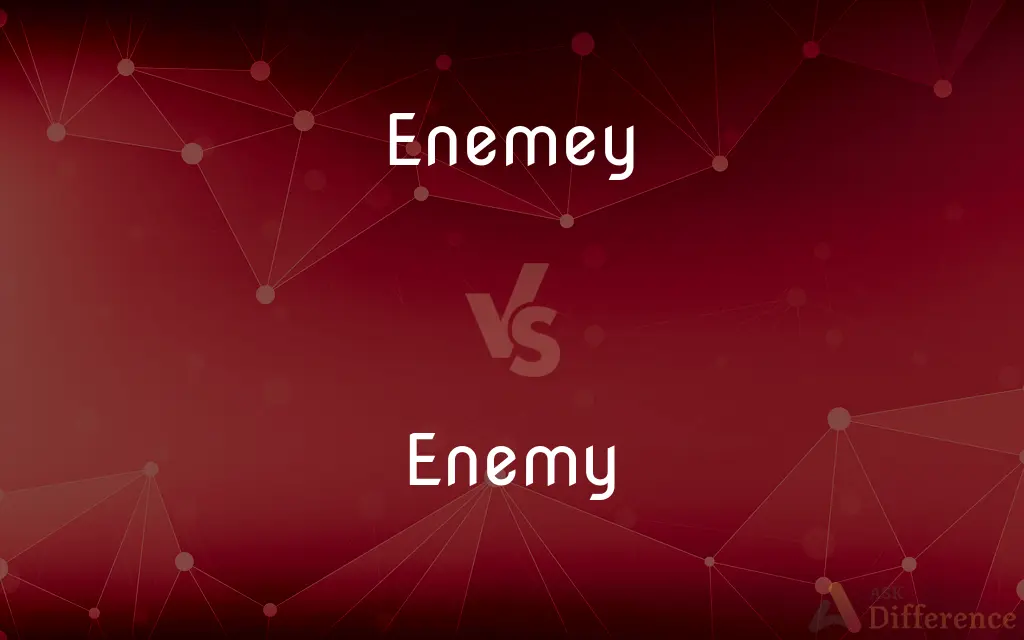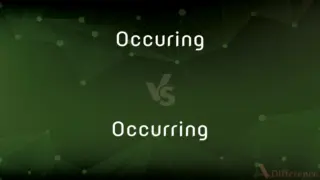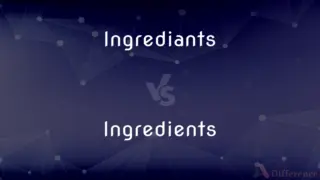Enemey vs. Enemy — Which is Correct Spelling?
Edited by Tayyaba Rehman — By Fiza Rafique — Updated on April 2, 2024
"Enemey" is an incorrect spelling; the right version is "Enemy," which refers to a person who opposes or harms another.

Table of Contents
Which is correct: Enemey or Enemy
How to spell Enemy?

Enemey
Incorrect Spelling

Enemy
Correct Spelling
ADVERTISEMENT
Key Differences
Remember there's only one 'e' at the end of "enemy."
Think of "end" without the "d" when spelling "enemy."
Remember the rhyme, "An enemy to me, ends simply with an e."
"Enemy" sounds like "M-E" (em-ee).
An "enemy" often ends things negatively.
ADVERTISEMENT
How Do You Spell Enemy Correctly?
Incorrect: Enemey forces were approaching the city.
Correct: Enemy forces were approaching the city.
Incorrect: She considered her rival an enemey, not a friend.
Correct: She considered her rival an enemy, not a friend.
Incorrect: He mistakenly viewed his mentor as an enemey.
Correct: He mistakenly viewed his mentor as an enemy.
Incorrect: They built defenses to protect against an enemey attack.
Correct: They built defenses to protect against an enemy attack.
Incorrect: The superhero fought against his greatest enemey.
Correct: The superhero fought against his greatest enemy.
Enemy Definitions
An opposing force in a game or competition.
In the game, he faced many enemies.
Something that harms or weakens something else.
Water is the enemy of paper.
A nation or force in conflict with another.
The country declared them as an enemy.
One who feels hatred toward, intends injury to, or opposes another; a foe.
One who opposes or is hostile to an idea or cause
An enemy of democracy.
Something destructive or injurious in its effects
"Art hath an enemy called Ignorance" (Ben Jonson).
A hostile power or force, such as a nation.
A member or unit of such a force.
A group of foes or hostile forces. See Usage Note at collective noun.
Of, relating to, or being a hostile power or force.
Someone who is hostile to, feels hatred towards, opposes the interests of, or intends injury to someone else.
Under enemy duress
He made a lot of enemies after reducing the working hours in his department.
You may not want any enemies, but sometimes, your enemies choose you.
A hostile force or nation; a fighting member of such a force or nation.
Rally together against a common enemy.
Something harmful or threatening to another
Of, by, relating to, or belonging to an enemy.
The building was destroyed by enemy bombing.
(video games) A non-player character that tries to harm the player.
To make an enemy of.
One hostile to another; one who hates, and desires or attempts the injury of, another; a foe; an adversary; as, an enemy of or to a person; an enemy to truth, or to falsehood.
To all good he enemy was still.
I say unto you, Love your enemies.
It was difficult in such a country to track the enemy. It was impossible to drive him to bay.
Hostile; inimical.
They . . . every day grow more enemy to God.
An opposing military force;
The enemy attacked at dawn
An armed adversary (especially a member of an opposing military force);
A soldier must be prepared to kill his enemies
Any hostile group of people;
He viewed lawyers as the real enemy
A personal enemy;
They had been political foes for years
A person who opposes or is hostile to another.
He is my sworn enemy.
Internal conflicts or challenges.
He was his own worst enemy.
Enemy Meaning in a Sentence
Soldiers are trained to face the enemy without fear.
The enemy of my enemy is my friend.
She wrote a story about a hero who forgives his enemy.
Their main goal was to defend their land from the enemy.
He learned that not every enemy should be met with aggression.
In the game, finding the hidden enemy was a key challenge.
The ancient fortress had withstood many enemy attacks.
He treated his illness as an enemy he had to defeat.
In the story, the protagonist learns to empathize with his enemy.
Protecting their secrets from the enemy was a top priority.
The spy infiltrated enemy lines to gather vital information.
Overcoming prejudice can turn an enemy into a friend.
The enemy troops were spotted marching towards the village.
To defeat your enemy, you must first understand them.
They used camouflage to hide from enemy surveillance.
They formed an alliance to fight a common enemy.
She considered ignorance her greatest enemy.
Understanding the culture of your enemy can prevent conflicts.
The treaty brought peace between former enemy nations.
An effective leader knows how to unite friends and divide the enemy.
The children played a game where they imagined battling an invisible enemy.
Enemy Idioms & Phrases
Behind enemy lines
In a position deep within the territory controlled by those one is fighting against.
The soldier's mission was to deliver a message behind enemy lines.
Public enemy number one
A person or thing considered to be the greatest threat to the public.
The notorious bank robber was declared public enemy number one by the authorities.
Sleep with the enemy
To be in a relationship or close association with one's opponent or adversary.
By negotiating with the corrupt politicians, he was accused of sleeping with the enemy.
Common Curiosities
What is the root word of enemy?
The root is derived from the Latin "inimicus" meaning "not friendly."
What is the verb form of enemy?
There isn't a direct verb form of "enemy." However, "antagonize" can describe actions that make someone an enemy.
What is the plural form of enemy?
The plural form is "enemies."
Which vowel is used before enemy?
Typically, "an" is used before "enemy."
Why is it called enemy?
Derived from Latin "inimicus," "enemy" refers to one who is not a friend or is adverse.
What is the pronunciation of enemy?
"Enemy" is pronounced as "EN-uh-mee."
What is the singular form of enemy?
"Enemy" is the singular form.
Is enemy an adverb?
No, "enemy" is not an adverb.
Which conjunction is used with enemy?
Any conjunction can be used based on context, e.g., "and," "or," "but."
Is enemy a negative or positive word?
Typically negative, as it denotes opposition or hostility.
Which preposition is used with enemy?
"Of" as in "enemy of the state" or "against" as in "fight against the enemy."
Is enemy a noun or adjective?
"Enemy" is a noun.
Is enemy a collective noun?
No, it's not a collective noun.
Which article is used with enemy?
Both "a" (a singular enemy) and "the" (a specific enemy or the concept in general) can be used.
Is enemy a vowel or consonant?
"Enemy" is a word containing both vowels and consonants.
How do we divide enemy into syllables?
En-e-my.
What part of speech is enemy?
It's a noun.
What is the second form of enemy?
Not applicable, as "enemy" is a noun.
Is the enemy term a metaphor?
It can be used metaphorically, e.g., "time is an enemy."
Is the word enemy imperative?
No, "enemy" is not imperative.
What is the opposite of enemy?
Friend or ally.
What is the first form of enemy?
"Enemy" itself is a noun, so it doesn't have verb forms.
How is enemy used in a sentence?
"She considered him an enemy after the betrayal."
Is enemy a countable noun?
Yes, you can have one enemy or multiple enemies.
Which determiner is used with enemy?
"The" when specific, "my" for personal, "an" in general terms.
Is enemy an abstract noun?
No, it's a concrete noun, but it can have abstract connotations in some contexts.
How many syllables are in enemy?
Three syllables.
What is a stressed syllable in enemy?
The first syllable, "En," is stressed.
What is another term for enemy?
Adversary.
What is the third form of enemy?
Not applicable.
Share Your Discovery

Previous Comparison
Occuring vs. Occurring
Next Comparison
Ingrediants vs. IngredientsAuthor Spotlight
Written by
Fiza RafiqueFiza Rafique is a skilled content writer at AskDifference.com, where she meticulously refines and enhances written pieces. Drawing from her vast editorial expertise, Fiza ensures clarity, accuracy, and precision in every article. Passionate about language, she continually seeks to elevate the quality of content for readers worldwide.
Edited by
Tayyaba RehmanTayyaba Rehman is a distinguished writer, currently serving as a primary contributor to askdifference.com. As a researcher in semantics and etymology, Tayyaba's passion for the complexity of languages and their distinctions has found a perfect home on the platform. Tayyaba delves into the intricacies of language, distinguishing between commonly confused words and phrases, thereby providing clarity for readers worldwide.


































